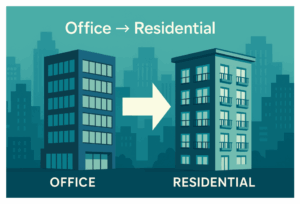Listen to our Podcast about Joint Venture vs. General Partnership in Real Estate
In the world of real estate investing and property deals, teaming up with others can open doors to bigger opportunities. But not all partnerships are created equal. Two common ways people collaborate on real estate projects are through Joint Ventures (JV) and General Partnerships (GP). These terms might sound similar, but they have distinct meanings and uses.
In this blog post, we’ll break down what each one means in plain English, provide clear examples, and highlight the key differences so you can decide which partnership structure might suit your next property deal.
What is a Joint Venture (JV) in Real Estate?
A Joint Venture (JV) in real estate is a one-time partnership formed for a specific project or investment. Think of it as a “temporary team-up” for a particular deal. In a JV, two or more parties pool their resources and expertise to accomplish a specific goal, such as buying and flipping a house or developing a property. Once that project is completed, the joint venture typically ends.
Key Features of a Joint Venture:
- Project-Specific and Temporary: A JV is formed for a single real estate project or a defined period. Once the goal is achieved, the partnership dissolves.
- Shared Resources & Expertise: Each party contributes something valuable, such as capital, industry knowledge, or management skills.
- Independent Outside the Project: Each partner remains a separate entity outside the JV deal.
- Agreed Profit Split: Profit (and loss) sharing is agreed upon in a joint venture agreement.
- Limited Liability (with the Right Structure): Many JVs form an LLC to protect partners from unlimited liability.
Example of a Joint Venture:
Imagine two investors, Alice and Bob. Alice finds a fixer-upper property but lacks funding, while Bob has capital but no time for renovations. They form a joint venture where Bob funds the deal, and Alice manages the renovation and sale. They split the profits 50/50. Once the house is sold, the JV ends.
What is a General Partnership (GP) in Real Estate?
A General Partnership (GP) is a more permanent business arrangement where two or more individuals co-own a business and share its profits, losses, and management responsibilities. Unlike a JV, a GP is not just for a single project but an ongoing business relationship.
Key Features of a General Partnership:
- Ongoing Business: A GP continues beyond a single project, handling multiple deals over time.
- Active Involvement: All partners typically play an active role in the business.
- Shared Profits and Losses: Partners split earnings and losses as agreed.
- Unlimited Liability: Each partner is personally liable for the partnership’s debts.
- Minimal Formalities: A GP can be formed with a simple agreement but requires proper financial records.
Example of a General Partnership:
Priya and Carlos start a real estate business together. They form a general partnership (P&C Homes) to buy, manage, and flip properties. Both contribute money and actively participate. Their partnership continues indefinitely, unlike a JV, which would dissolve after one deal.
Key Differences: Joint Venture vs. General Partnership
| Feature | Joint Venture (JV) | General Partnership (GP) |
|---|---|---|
| Scope & Duration | Single project, short-term | Ongoing business, long-term |
| Purpose | One-time collaboration for a specific deal | Continuous business operations |
| Legal Structure | Often an LLC to limit liability | No separate entity, partners share full liability |
| Involvement | Roles vary; some provide capital, others manage | All partners actively participate |
| Flexibility | Easy to structure, ends after project completion | Requires dissolution if partners part ways |
Which Should You Choose?
Ask yourself:
- Is this a one-time deal or a long-term business?
- How do you feel about liability?
- What does each party bring to the table?
- What level of complexity and formalities do you prefer?
JVs work best for one-off deals, while GPs suit ongoing real estate businesses. Consider your risk tolerance and goals before choosing.
Conclusion
A Joint Venture is a short-term collaboration for a specific project, whereas a General Partnership is an ongoing business. Both have advantages and risks, so choosing the right structure depends on your investment strategy.




